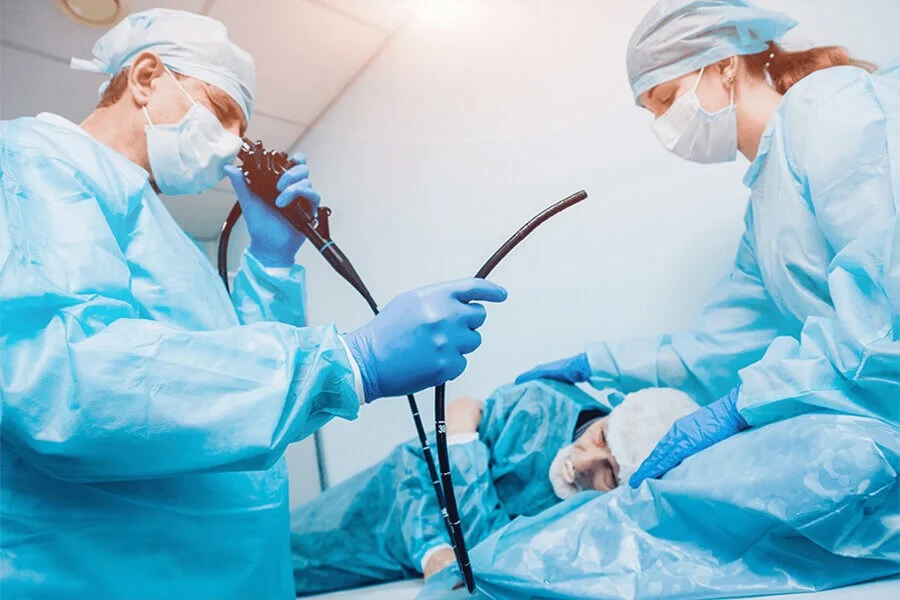What is an endoscopic ultrasound (EUS)?
An endoscopic ultrasound (EUS) is a specialized procedure where a flexible tube, known as a scope, is inserted either through the mouth to the small intestine or via the rectum. Equipped with a light, camera, and an ultrasound probe, this scope enables physicians to thoroughly examine the inner layers of the gastrointestinal tract as well as adjacent organs like the pancreas and biliary system. Often used for cancer staging, an EUS can help diagnose and initiate treatment for various intestinal and organ abnormalities. If you’re facing gastrointestinal issues, reach out to Gastroenterology Associates to learn more about EUS and other diagnostic options. Our Baton Rouge, LA gastroenterologists are ready to help.

Why would I need an EUS?
At our Gastroenterology Associates locations, we frequently employ endoscopic ultrasounds for a broad range of diagnostic reasons. This cutting-edge imaging tool is exceptionally versatile and can be used for:
- Studying tumors or abnormalities in key organs like the gallbladder and liver
- Investigating nodules in the intestinal wall
- Evaluating the stages of cancer
- Understanding disorders of the pancreas
- Analyzing the muscles of the lower rectum and anal canal to determine the causes of fecal incontinence
- Assessing Barrett’s esophagus
- Identifying bile duct stones
- Evaluating conditions like sarcoidosis
This multi-purpose diagnostic tool is essential for comprehensive medical evaluations and helps our gastroenterologists offer the most effective treatment plans for patients.
What should I expect the day before my endoscopic ultrasound?
Your GI doctor will provide you with specific guidelines on how to prepare for your endoscopic ultrasound exam. Generally, you can eat as usual the day before, but after midnight, you’ll need to fast, except for taking prescribed medications. Following these directions is crucial for accurate test results. Additional guidance will be offered about your current medications — most can be continued as usual. Special attention will be given to those on blood thinners or diabetes medication, tailoring instructions to ensure safety and efficacy.
What happens on the day of my endoscopic ultrasound?
You’ll need to arrive for your procedure 1 – 1.5 hours before your scheduled exam. This window allows you ample time to complete necessary paperwork and get prepped for the procedure. You’ll change into a medical gown, and an intravenous (IV) catheter will be set up in your arm for administering sedation. Meanwhile, monitoring equipment will be connected to keep tabs on your vital signs like heart rate, blood pressure, and oxygen level throughout the exam.
In the exam room, you’ll lie on your left side on a stretcher as the sedation kicks in. The doctor will administer the sedative in small increments to gauge your individual needs. Once you’re sufficiently sedated, the endoscope will be gently inserted into your mouth and guided through your esophagus, stomach, and the first part of your small intestine. Air may be injected to facilitate a better view, and any remaining fluid will be suctioned out. Depending on what is discovered during this 30 – 60-minute procedure, actions like biopsies or polyp removal could be carried out.
After the exam, you’ll be moved to the recovery room, where you’ll be monitored as the sedation wears off. Typically, patients are awake and ready for discharge within 45 – 60 minutes. However, you won’t be allowed to drive or undertake strenuous activities for the rest of the day. While most people can eat and drink normally post-exam, you’ll receive specific instructions about your activities and medications prior to leaving the center.
Lastly, your doctor will discuss the findings with you, though the effects of sedation often make it hard to remember these details. Therefore, it’s a good idea to bring someone along who can also listen to the results. You’ll leave with a typed report and be notified of any biopsy results within a week.
What are the risks of an endoscopic ultrasound?
If you’re contemplating an endoscopic ultrasound (EUS), it’s natural to have some questions about the procedure’s safety. Our team is committed to alleviating your concerns by providing top-notch care from the get-go. While endoscopic ultrasounds are typically very safe, there are certain risks involved, as with any procedure.
Our trained staff will thoroughly review the consent form with you prior to the test. Should you have any lingering questions or concerns, we are always available for a consultation.
Concerns can sometimes arise due to the sedation medication used during the procedure. Possible reactions may include allergic reactions, difficulties in breathing, changes to heart and blood pressure, and irritation at the site where the medication is administered.
Although bleeding can occur with procedures like biopsies and fine needle aspirations, it’s rare for the bleeding to be significant enough to warrant a blood transfusion or hospitalization.
Perforation or puncture of internal organs (like the esophagus, stomach, small intestine, or rectum) is another potential but uncommon risk. Should this occur, it will typically require immediate surgical intervention and a hospital stay.
Post-procedure, it’s imperative to promptly contact Gastroenterology Associates if you experience symptoms like worsening abdominal pain, bleeding, or fever. It’s important to remember that like any other medical test, EUS isn’t foolproof. Though it’s a highly reliable diagnostic tool, there is a small chance that it could miss abnormalities, including cancers. For this reason, continuous follow-up with your healthcare providers is vital.
What are alternatives to an endoscopic ultrasound (EUS)?
At our Baton Rouge, LA locations, our skilled GI providers often recommend endoscopic ultrasound (EUS) as the gold standard for assessing issues within the gastrointestinal (GI) tract. While the necessity of an EUS largely hinges on your specific medical needs, other diagnostic tests like CT scans, MRIs, and transabdominal ultrasounds can also offer insights into GI abnormalities. However, it’s important to note that these alternative methods are generally diagnostic and may not offer the same comprehensive view that an EUS provides.

